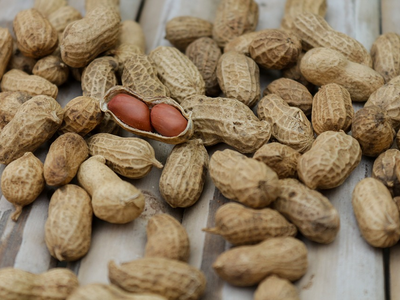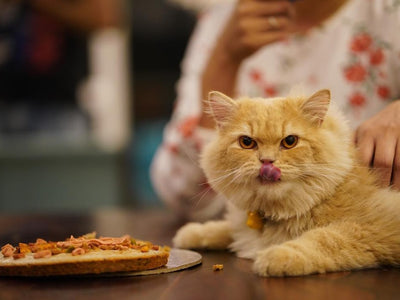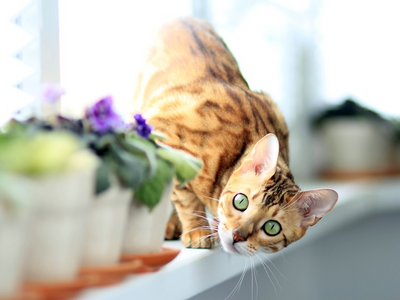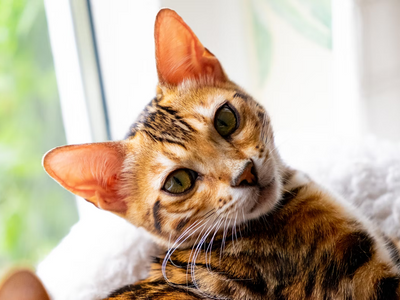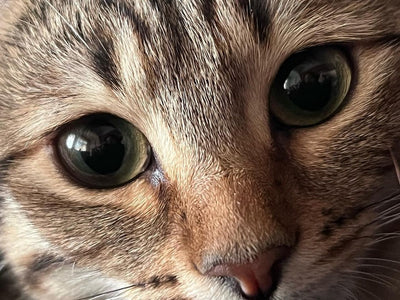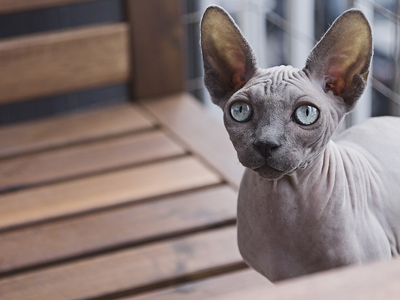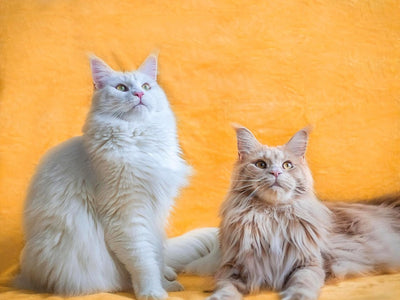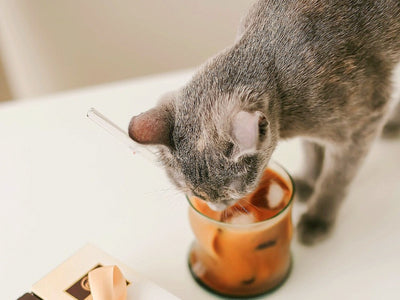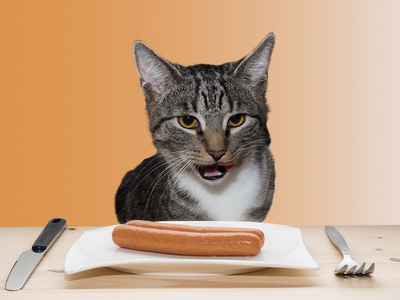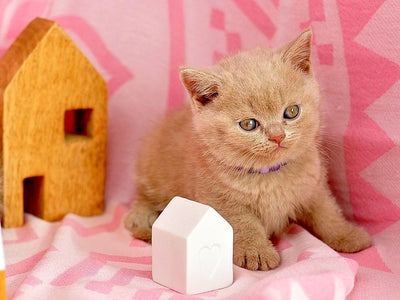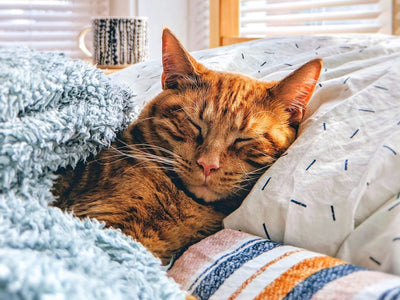23.02.2022
Can cats drink soya milk, or is it for human beans only?
Soya milk is one of the most popular alternatives for those struggling with lactose intolerance, but does that include our feline friends? Since most cats lack the digestive enzymes to process dairy, it seems that soya milk and other substitutes are a logical replacement.
So, can cats drink soya milk, or are there some health concerns you should consider? Let’s see why the popular plant-based beverage is a no-no food for felines and explore healthier options!
Is soya milk good for cats?
Most cats can’t process lactose, meaning even a relatively small amount can cause indigestion. Because of the innate intolerance toward dairy, soya milk comes to mind as a potential replacement. While it’s true that the plant-based beverage is completely lactose-free, it contains other substances harmful to cats.
Soya milk is made by soaking and grinding whole beans in water or boiling soya flour to filter the milk. The result is not only lactose-free but also devoid of cholesterol and saturated fats, which is why it’s considered healthy.
If that’s the case, why shouldn’t I give my cat soya milk? Even with lactose out of the way, soya milk contains complex carbohydrates your carnivorous cat can’t digest—mainly stachyose and raffinose. The ingredients can hinder their wellbeing in several ways and cause the following:
- Gastrointestinal problems—The sugar in soya milk will wreak havoc on your cat’s stomach, especially if they are prone to GI issues (e.g. senior cats with sensitive stomachs or cats suffering from an inflammatory bowel disease). Your pet can experience diarrhoea, vomiting, abdominal bloating and pain from a few sips
- Dental disease—Sugar can contribute to the development of dental disease in felines, leading to decay and eventual tooth loss. Senior cats with deteriorating teeth are especially at risk, as well as breeds who are prone to dental problems (e.g. British Shorthair)

Soya is an excellent protein source…for you! Our feline friends should steer clear of the magic beans.
Source: engin akyurt
Cats, soya milk, and feline obesity
One cup of soya milk contains 80–100 calories, which doesn’t fit the recommended allowance for felines. The excess can contribute to unhealthy weight gain and feline obesity.
Obesity is a common affliction in cats, especially oldtimers who often have decreased mobility and a slower metabolism. Some breeds, like Maine Coons and Ragdolls, are also genetically predisposed to develop the condition. Obesity is considered a precursor to diabetes, hypertension, and heart disease, so keeping your cat’s weight in check is one way to prolong their lifespan.
You should always encourage your pet to exercise, track their weight using a comparative weight chart, and stay within the recommended calorie intake when serving food.
How many calories should a cat eat in a day? Indoor cats who tend to have a sedentary lifestyle require approximately 40 calories per one kilo of their weight (the numbers can vary based on the breed, sterilisation status, and specific medical conditions). The average adult cat weighs around five kilos, meaning the ideal daily allowance is approximately 200 calories, full meals and complementary food included.
With almost 100 calories per cup, soya milk is waaay too caloric! Even if your cat could digest it without experiencing GI issues, it wouldn’t be a healthy food choice.
Can kittens have soya milk?
Newborn kitties shouldn’t eat or drink anything besides breast milk in the first three to four weeks after birth. In the case of foster kittens who are separated from their moms, a milk replacer formula is the only viable source of nutrients. If you have a baby cat at home, don’t give them cow or goat milk because it’ll only upset their tummy.
Can you give kittens soya milk? Absolutely not. Kittens have extremely sensitive stomachs, and feeding them the sugary plant milk will almost certainly give them diarrhoea. Instead, use a milk replacer formula (KMR) to sustain their growth and weight development.
Even after they start weaning, kittens shouldn’t eat anything that might cause indigestion. If a fully-grown cat can’t handle soya milk, it’s definitely unsafe for the babies. Kitties need a balanced diet of animal protein, fat, and calcium, with the following ratio:
|
Nutrient |
Recommended amount |
|
Protein |
Over 50% |
|
Fat |
Up to 20% |
|
Calcium |
Around 1.5% |
Luckily, you can find specially formulated food for kittens with an adequate nutrient ratio in your local pet store. Not only will the recipe safeguard your kitty’s stomach, but it’ll also provide enough nourishment to support their daily shenanigans.
You can choose between wet and dry variants, although moist and semi-moist products provide better hydration. It’s okay to add some variety to their diet with treats but stick to kitten food and KMR for the main course.
What to give your cat instead of soya milk

What do you mean “cats and soya milk are a bad match?” I happen to like it…although it is a tad heavy on the gut!
Source: Omar Ramadan
If the answer to “can cats have soya milk” is a resounding no, are there any “milk-adjacent” products your pet could try? Sure, but sparsely and in tiny amounts.
For starters, not all dairy is strictly off-limits. Yoghurt is filled with probiotic bacteria and calcium, which can be beneficial to felines. A few sips of Activia can work wonders for a constipated cat! As long as it’s not part of their daily meals, yoghurt can be good for your cat’s gut.
Lactose-free cow milk is also safe for cats, although it lacks essential nutrients. Treats should have nutritional value, so giving your cat lactose-free milk is redundant. Instead, look for specially formulated, feline-friendly milk products that contain minerals, vitamins, and malt extract, which is good for hairball digestion.
Ultimately, try not to enable your cat’s “milk addiction.” Whether it’s lactose-free or “cat-safe,” your feline friend won’t gain much from milk in terms of nourishment. A little bit of yoghurt to cure a stomach bug is fine, but don’t go beyond that.
How do you stop your cat from craving soya milk? With a well-balanced diet, of course!
Cats can develop unhealthy eating habits when left to their own devices. That’s why you need to impose a well-balanced, meat-based diet that will stop them from seeking out “junk food.”
Look for products that are:
- Rich in moisture—Cats mostly hydrate through their meals. Without water, they’re at risk of developing bladder stones and other urinary tract diseases. Your cat should get approximately 100 millilitres of water per two kilos, which adds up to around 200ml per day for the average adult cat
- High in protein—Protein is the catalyst of every metabolic function in the feline body. The macronutrient provides amino acids that cats can’t synthesise, like taurine and arginine, and sustains their brain, eye, and heart function
- Low in carbs—The feline digestive system lacks the enzymes to break down simple sugars and starch. Ideally, your cat should have less than 3% carbs in their daily meals. Stuffing your feline with carbohydrates can lead to chronic illnesses, such as diabetes mellitus and feline obesity
Off-the-shelf whole meat wet food is designed to fit these requirements, satiating your cat’s hunger without messing with their metabolism.
Some cats can be put off by the texture of wet food at first, especially if they’re used to eating kibble. Try to correct that behaviour because a dry-food-only diet can be harmful in the long run. Biscuits and similar types of cat food are highly caloric and extremely dry, so it’s best to serve them in combination with wet food, if at all.
Looking for healthy and delicious cat food for your beloved pet? Get Untamed!
Soya milk and other plant-based food have no place on your kitty’s menu! Your feline friend should enjoy protein-packed meals that cater to their carnivorous nature. Untamed food is carefully designed to resemble the cat’s natural diet, with each nutrient-dense recipe being:
- High in protein—A single serving of Untamed food contains twice as much protein as the industry standard. Our products are free from plant protein, sugar, grain fillers, or other useless or harmful substances. We use only the best animal protein to cover your cat’s nutritional needs
- Made with whole meat—The meat cuts we use in our delicious recipes are of human-grade quality. Each ingredient is gently cooked to maintain the original nutritional value and ensure the final product is as replenishing as it is delicious
- Vet-formulated—Our meals were designed with the help of veterinary experts, making sure your cat’s unique biological needs are met. Each serving is highly nutritional and free of all known allergens
- Ethically produced—We do a lot to help create a better world for our feline friends. Our packaging is 100% recyclable to protect the environment. We are 100% Carbon Neutral Certified and all our ingredients are ethically reared and sustainably caught
- Impossible to resist—We’re quite confident our appetising recipes can win over the pickiest of eaters! Watch as your formerly fussy cat licks the bowl and asks for seconds each time
Why go Untamed?
All Untamed products are made with premium meat cuts that’ll make your cat go wild! If you take our online quiz, you can create a custom menu for your pet and get them hooked on our tasty and nourishing meals. You’ll be able to choose from a wide range of our feline delicacies, such as:
- Chocka Chicken in Jelly—Premium chicken breast dipped in mouth-watering jelly
- Tuck-in Tuna in Jelly—Dolphin-safe tuna steak in jelly and appetising fish broth
- Chocka Chicken with Duck in Jelly—Fresh chicken breast spiced up with delicious duck meat, served in jelly
- Tuck-in Tuna with Salmon in Jelly—Tuna steak in jelly complemented with high-quality salmon fillet
- Chocka Chicken in Gravy—Shredded chicken breast simmered in natural gravy

Our Chocka Chicken in Jelly recipe is a favourite among Untamed cats!
Image (c) Untamed
Being “fussy eater approved” is not the only advantage of our feline cuisine. Our satisfied clients have noticed improvements in their pet's overall health after choosing the monthly healthy cat food subscription we offer! Here’s what Untamed could bring to your table, based on our clients’ feedback:
|
Timeline |
Health benefits |
|
Within a week |
|
|
After two months |
|
|
Within four months |
|
|
Life-long benefits |
|
Join our proud clowder today!
You don’t have to jump through hoops to join our ever-growing community of cat lovers. Sign up for a cat food trial pack online and select a suitable meal plan for your feline companion. All you have to do is follow these simple steps:
- Visit our TRY NOW page
- Tell us about your cat (life stage, food preferences, allergies, etc.)
- Choose a meal plan and confirm your order
We'll deliver your custom-made meal box within 24 hours, with no additional shipping fees! If your cat is satisfied with the trial pack, you'll get monthly supplies of Untamed products at the same time every month.
You can make adjustments to your initial order as easily. Let us know if you’d like to change, cancel, or postpone your monthly delivery, and we’ll take care of it in no time!

Surprise your cat with a box of their favourite flavours!
Image (c) Untamed
Are other plant-based milk alternatives harmful to cats?
Since cats and soya milk don't mix, let’s look at other plant-based alternatives and see how they affect felines:
- Coconut milk—A cup of coconut milk contains five grams of fat, making it the “fattiest” vegan alternative to milk. The high concentration of saturated fats can provoke gastrointestinal problems in cats, like vomiting and diarrhoea. Other coconut byproducts, such as coconut oil, are less harmful. Coconut oil can be used as a home remedy for arthritis and other inflammations but only in tiny amounts
- Almond milk—Although it has fewer calories than soya milk, almond milk is still too caloric for cats. One cup contains between 30 and 60 calories and three grams of fat. The plant-based beverage can still cause abdominal discomfort, from bloating to vomiting and diarrhoea
- Rice milk—Rice milk has the highest carbohydrates content of all plant-based milk substitutes, with over 20 grams per cup. In the feline diet, carbs should be kept below 3%. By itself, rice isn’t necessarily harmful so much as it’s useless. Grain has zero nutritional value for cats and is mostly used as filler in low-quality cat food
Remember, your cat is not a vegan!
Plants and plant-based products can’t meet your cat’s energetic and nutritional needs.
Felines are obligate carnivores, meaning they need loads of animal protein to maintain a healthy metabolism. Besides being their primary energy source, the macronutrient is also responsible for tissue formation, muscle growth, and vital organ function.
In terms of bioavailability, meat is the only acceptable protein source, and that’s why it should be the basis of your cat’s diet.
It’s okay to let your cat try some meat-free treats once in a while, like when they have an upset stomach. Fibre can induce bowel movements as long as you adhere to the recommended allowance for cats (no more than 3%).
Stick to these feline-friendly fruits, veggies, and plants:
|
Fruits |
Veggies |
Plants and fungi |
|
|
Your cat might enjoy the occasional fruity snack, or they might reject it completely. Should that be the case, don’t force the habit since there are much healthier options. If you want to spoil your feline friend, grab a cutting board and give them a slice of:

Meat is neat! Your cat will enjoy a turkey slice much more than they would a brussel sprout.
Image (c) Untamed
What other foods are off-limits?
Cats and soya milk aren’t the only food mismatch. The following ingredients are highly toxic to felines:
- Allium vegetables—Onions, garlic, chives, and shallots belong to the allium plant family that’s poisonous to cats. The veggies contain oxidants that destroy red blood cells and cause anaemia and kidney failure in felines. Even a tiny amount of garlic powder could damage your cat’s internal organs, so be careful when preparing homemade meals, like meat soup or bone broth
- Citrus fruit—If your cat eats an entire clementine section, they’ll most likely suffer from citric acid intoxication. The tropical fruits can even cause skin inflammations in felines prone to allergies. Besides citruses, grapes and raisins are also poisonous to cats
- Raw food—Microbial pathogens, like tapeworm, Salmonella, and Listeria, can often be found in raw meat (chicken, fish, pork, etc.), eggs, and even unpasteurised milk. Don’t give your cat undercooked ingredients, especially if they’re pregnant or have a weakened immune response or you risk losing them
- Caffeine—Chocolate might be your favourite treat, but you should keep it away from your cat. Products that contain caffeine can cause restlessness, heart palpitations, muscle tremors, and breathing difficulties in felines
- Raw dough—Felines can’t digest the yeast in raw bread dough, so the substance might linger in their stomach and cause abdominal pain, flatulence, and intestinal blockage. The residue will start to ferment and eventually turn into alcohol, which is potentially life-threatening. A mere tablespoon of brandy can put a fully grown Siamese cat in a coma, so make sure to clean the bowl after making homemade fettuccine
Check out our other guides to what cats can or cannot eat:
|
|

![Associated image for What human food can Sphynx cats eat? [Comprehensive list]](http://untamed.com/cdn/shop/articles/what_human_food_can_sphynx_cats_eat_Featured_400x300_crop_center.jpg?v=1648705074)
